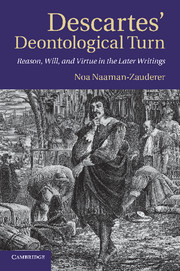Book contents
1 - Looking inward: truth, falsehood, and clear and distinct ideas
Published online by Cambridge University Press: 10 January 2011
Summary
In the Meditations on First Philosophy published in Latin in 1641, Descartes aims to lay the metaphysical foundations of his science. To use his later “tree of philosophy” metaphor, he intended the Meditations to provide the metaphysical roots for the trunk of physics and for all the other sciences – the branches emerging from the trunk – which he reduces to medicine, mechanics, and morals. In the waning days of 1640, Descartes writes to his friend Marin Mersenne that he meant the title of this work, Meditationes de Prima Philosophia, to indicate that it deals “not just with God and the soul, but in general with all the first things that can be discovered by philosophizing in an orderly way.” For this purpose, as he later writes to the same correspondent, “we have to form distinct ideas of the things we want to judge about, and this is what most people fail to do and what I have mainly tried to reach by my Meditations” (AT iii 272: CSMK 165).
The Meditations offers a new method for acquiring clear and distinct perception by withdrawing one's mind from the senses and eliminating prejudice. The First Meditation exemplifies the method of doubt, whose greatest benefit, Descartes contends, “lies in freeing us from all our preconceived opinions, and providing the easiest route by which the mind may be led away from the senses.”
- Type
- Chapter
- Information
- Descartes' Deontological TurnReason, Will, and Virtue in the Later Writings, pp. 10 - 60Publisher: Cambridge University PressPrint publication year: 2010



